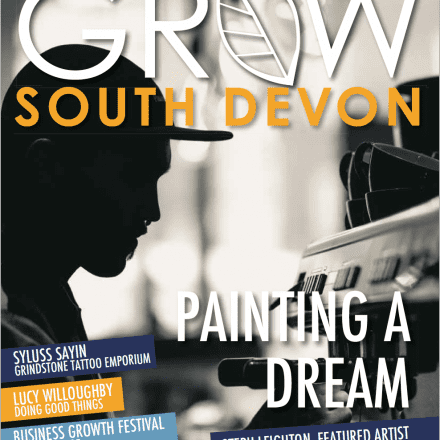
For The Love Of Our Planet
Louise Palmer-Masterton Offers Advice on How we can Turn Things Around for the Better
There is a stark message in David Attenborough’s latest documentary, ‘A Life on our Planet’.
Described as his ‘witness statement’, the film contained a plethora of compelling statistics that defined the devastating problems we face if we do not stop destroying our planet. The film shows the numbers for the rapid increase in global population, the increase in carbon in the atmosphere, and the accompanying sharp decrease in unfarmed natural land.
Attenborough does, however, end with a ray of hope, as he lays out the steps we need to take to quickly redress the balance and allow the planet to recover.
These steps are simpler than you might think.
- Rewild the rainforests to restore biodiversity. Rewild more farmland.
- Stop eating meat. For every one carnivore in nature there are at least 100 prey animals, so for 11 billion humans to be carnivores is completely unsustainable.
- Abandon fossil fuel in favour of renewable energy.
- End poverty and increase access to education for all people, which will naturally lead to population control. This, of course, requires global commitment.
- Using less land in more intelligent ways to produce more food, such as vertical and urban farming.
- Stop Waste. Full stop.
You probably think that most of this list is beyond the sphere of influence of an individual or an individual business, with international action and financial incentives needed for this to happen on a global scale but we can all instigate actions that make a difference. Some of these involve supporting non-profits in a financial sense, but many of the actions we can take are changes within our own supply chains which are not disruptive or costly. They simply involve making more ethical choices in our purchasing decisions.
And with a recent Futerra survey showing that 88% of consumers want brands to help them be more sustainable it’s also a shrewd business decision to make positive changes within our own businesses.
Rewilding
Work with the many new ethical suppliers who are themselves making a difference. For example, we work with a tea supplier called Reforest Tea. For one 500g bag of breakfast tea, costing £12, they are able to plant 6-8 trees. Perform your own sustainability audit (there are also individuals and organisations that can conduct this for you, or you could simply do it yourself). For example, it’s now widely known that palm oil is one of the main reasons that the rainforest has been destroyed, so eradicating it in your home, business and supply chain is one way of making an impact.
More Vegan Meals
It’s simply not sustainable for the 11 billion animals on the planet to eat other animals. But what does this mean for a business or for one that serves meat? And what if your offering is purely meat based, like a steakhouse? Fortunately / unfortunately it means you need to pivot your business model. Although it might feel like your offering is well supported now, it will become increasingly regarded as unethical in the future.
If you have a staff canteen, look to increase the plant-based offerings. Educate your staff about eating less meat (whether that’s avoiding it for a few days a week, or putting less on the plate). If you host events that involve food (whether canapes or a full sit-down), ask your caterers to provide a good choice of plant-based options, or better still (like many companies and charitable organisations) choose to make your events 100% plant-based.
I’m not lecturing here, but don’t count on people wanting to continue eating meat in the future like they do now. So now is the time to explore plant-based options that suit your brand.
Using renewable energy
Businesses can make a huge impact by simply moving to renewable only energy sources. There are a number of these now, including the most established Green Energy and Ecotricity. But we can go one step further. Who are your investors? What are their green credentials? Do they invest in fossil fuels? Who are your partners? Who are your landlords? Scrutinise everything. Ask the questions. Take every opportunity you can to bring attention to this.
Education
Attenborough states that to achieve the eradication of poverty, education, particularly of women, plays a huge part. Consider donating a small part of your income. Camfed, a charity directly impacting the education of women is an example of an organisation working towards this aim.
Vertical and Urban Farming
I visited Amsterdam in those heady days before Covid-19. There are some super-exciting projects there with vertical and urban farms. They are a big exporter of vegetables because of this. They get a greater output from a much smaller footprint in this way. It’s now also breaking into the hospitality sector. I visited a restaurant called Juniper & Kin which is on the top floor of a tall hotel building. They have a green house on their roof and grow a high percentage of their produce there. There are a number of similar operators in the UK
Waste
Probably the biggest issue of all!
Packaging Waste
There’s a huge amount of misinformation out there on this subject, especially with regards to single use. I watched a short film recently, called Our Planet, Our Business and one of the experts said, ‘there is no such thing as waste, it’s just a commodity in the wrong place at the wrong time’. That really struck me. Packaging is a complicated subject that we’ve been immersed in researching for some time, and here is what we have learned:
- Compostable is not the answer to the issue of single use, as compostable containers are widely made from virgin materials, which increase the carbon footprint of the product.
- The only truly sustainable, circular solution for packaging is to use products that are made from 100% recycled post-consumer waste, which are then endlessly recycled. So, we’re no longer using single use anything.
- When the world is truly plastic free, then it may be that recycled packaging which is also compostable could play a part. But, while we have such huge amounts of post-consumer plastic waste, the most responsible thing we can do is recycle it.
- Of course, responsible use of recycled plastic products requires education, and we need to invest energy into just that. The leap we all need to make is to start viewing plastic (and everything else on this planet) as a valuable commodity.
Other Waste
At Stem & Glory, we’re currently fitting out a new site in Cambridge. The driver behind our decor is reuse and recycle as far as possible. It’s been great to see that there are so many new products on the market that are composed of recycled post-consumer waste. We predict that this will explode massively in the coming months and years.
As part of this process we have also been able to get our entire team on board - from designers to contractors, all are now also committed to the reuse and recycle way of living.
This is probably actually the best way we can win hearts and minds to tackling climate change. Never underestimate the contribution that an individual or individual business can play. By changing ourselves we generate spirals of positive influence! The more you make changes and tell others, the more people you will influence for good.
ABOUT THE AUTHOR
Louise Palmer-Masterton is founder of multiple award-winning restaurants Stem & Glory; hip and trendy but accessible plant-based restaurants, serving delicious gourmet vegan food from locally sourced ingredients, 100% made on site. Stem & Glory also offers click-and-collect and local delivery in London and Cambridge.
Social Media:
Web: www.stemandglory.uk
Twitter: @stemandglory
Facebook: https://www.facebook.com/stemandglory/
Instagram: @stemandglory
Linked in: /louisepalmer-masterton
Notes:
David Attenborough: A Life On Our Planet – is available on Netflix
Our Planet, Our Business: https://www.youtube.com/watch?v=JdWQJq2OkJs&feature=youtu.be










